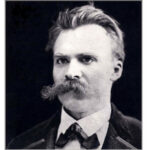Friedrich Nietzsche’s
“THE GAY SCIENCE”
Psst, psst…! Hey you…human being, I dare you! Walk without crutches! Face life on your own! Take it like a man! But what kind of man has the German philosopher Friedrich Nietzsche outlined to be up to that challenge? He does not lead us to such a man, he merely insinuates the way with riddles, as if saying: “Follow me… those who can.” Thus, we are off on a voyage of discovery. In the horizon looms the land of Self. First, we must come “across the river of becoming.” The path is always up and forward, and when we feel confident of having reached the peak of the mountain, he reveals a waiting abyss. He lets go of us, but not without yelling: you can fly!
In The Gay Science, Nietzsche addresses himself to those whose “ears are related”to his. He doesn’t want to be understood just by “anybody,” but by those who, according to him would be of “nobler spirit and taste.” He makes a clear difference between these “preparatory human beings” (he is convinced no one has ever lived to such a challenge) and the “others”. The Self that Nietzsche fathoms is a heroic one: an artist and a sage. He must create the ultimate masterpiece: himself. But, in order to do that he must first destroy his greatest creation: God.
The first part of the voyage is a departure from the land of certainties. We must sail off from the irrefutable “truths” of morality, science and religion, since they are only convenient errors/lies that have been accepted by convention in order to assure the survival of the species. The “higher type” of human being doesn’t submit to what is considered the “reasonable” thing to do, that which is good for the herd, but not for the self. The Self that looms in the horizon applies his strength and reason to its own preservation, development, elevation, promotion and expansion of power. Even though Nietzsche defines this as the ideal, he warns against the danger of everyone becoming one. Only those who are the “exception” should pursue this conviction since, he acknowledges, if the majority of men had not considered themselves “friends of a healthy common sense,” humanity would have perished long ago.
But the “higher type” can, and should, exercise his intellectual conscience and be able to see the difference. By doing so, he is contributing to the well being of the herd–As he challenges their convictions, he reinforces the herd’s “useful mistakes.” The potential Self that Nietzsche sketches should restate his notions of good and evil and realize that they are just a matter of perspective. It’s good if it’s beneficial for me, or evil if it goes against my wishes. There is nothing good or bad in itself. The only “valid” criterion is the human point of view. In fact, the “wheels” of history move because there is always someone desiring something. Even if those desires seem evil to those whose interests they affect we would have perished without them. These desires respond to passion, to the will to possess, the will to power.
The Self that Nietzsche fancies should never give up his passion for that fallacy called “rationality.” Will is the decisive sign of sovereignty and strength of an autonomous Self. One should neither obey nor rule, but experience things by oneself. One should have one’s own laws, joys and rights.
Thus, our “boat” leaves behind the land of society, tradition and culture. Nietzsche, challenges us again and again to be up to the phenomenal task he proposes knowing that only a few will prevail. The man that he meticulously outlines should dispose of fake values of which selflessness is the most pernicious, he tells us readers. It is for the convenience of the herd that man has been forced to abdicate himself as an individual, to resign to his will to do what would benefit him and not others. But, now “a weakened, extinguished personality that denies itself is no longer fit for anything good.” Selflessness has no longer value, either here, or in heaven.
Hence, Nietzsche pushes away the Self from the past. The challenge becomes proportionally more difficult as we go deeper anddeeper into the “waters” of self-discovery. Now, we “conquerors of an ideal,” must sailaway from the “continent” itself: God. Nietzsche objects mainly to the Christian notion of God because of what, he believes, it has done to the Self. Nietzsche considers that Christianity inflicts feelings of shame and guilt in the individual that are very harmful for the self-esteem.
Unlike Ralph Waldo Emerson, Nietzsche doesn’t believe that through nature, God “speaks” to us. He rejects the idea that man is, and that the world is. We don’t “face” each other. He believes the world and we are subject to the same determinism without purpose. In that sense, the Self that he designs is, paradoxically, not unique.
And so “god is dead” and here we are at the point of no return. In book IV, Nietzsche warns us: “you are entering a different dimension.” The philosopher knows that the way from here on might be unbearable for most of us. We feel we have “burnt” all our ships. “But fear not,” Nietzsche seems to say; “…there is still one, that in which you travel yourself: the prodigious “I”, a vessel, which, when properly maneuvered, will keep you afloat. But, as we begin to glimpse the land of hope, an island of respite to look back and feel proud of how far we’ve traveled, he wickedly turns the rudder again. “It is not a path, it’s a circle, you will have to start all over again.” This is the ultimate challenge. He throws in the table his dare of the “eternal recurrence” and expects us to say yes to a demon.
You need to have become a colossal Self at this point to even consider it. The wayleads nowhere and still he expects us to take it?! There is really no sense in having a “soaring desire for the heights”, no elevation, no final enlightenment? “No, but there is still YOU,” he comforts us. It is important to realize at this point Nietzsche’s circumstance when he wrote The Gay Science. As he declares in the prologue, he was emerging from an illness that subjected him to a “long, slow pain that takes its time”. The “tyranny of pain on which we are burned, as it were, with green wood.” Nothing like physical pain to force one mercilessly into the irrefutable evidence of one self . Physical pain gives no truce. No way of “transcending” oneself. The colossal self that Nietzsche designed in this book could have been a way of preparing himself for the inexorable return of illness.
Is the “eternal recurrence” a way of saying YES to life even while in pain? In any case, he writes from convalescence – a middle ground were both, illness and health, are equally at sight. From there, he considers that every system of thought “…craving for some Above, Beyond, Outside…” must have been invented while in illness, seeking a remedy for pain. In his case the “tyranny of pride” refused him such a relief.
Nietzsche promises that the “no exit” that his “eternal recurrence” presents will make us like a lake that ceasing to permit itself to flow off will form a dam that will rise higher and higher. However, our voyage ends in the sea, the incommensurable sea of the Self. A sea that “lies open again.” It is our departure and destination. We should never setfoot on any “land” again. Is that our will?


